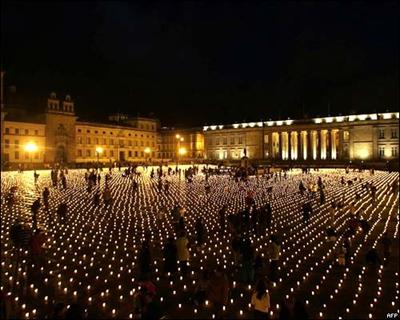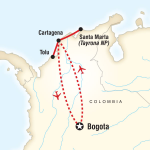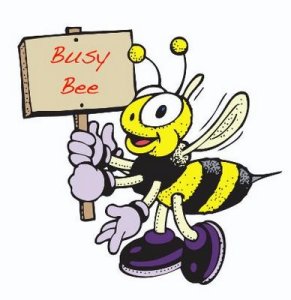At y to, las preposiciones en inglés, parte 1
…English Prepositions:
At and to, part 1
Too often I hear errors with at and to when talking with Bogotanos. We’re going to try to help fix these errors with this first post on prepositions at and to. We’ll break it down from the easy to the hard.
EASY DIFFICULTY
The preposition at is used to show a specific position or direction. To is used to show movement.
- I met her at the transmillenium station. (Position, a specific place)
- She was at her parents’ house. (Position, a specific place)
- We are going to the transmillenium station. (Movement in the direction of the tranmuylleno station)
- I am going to Medellín to see him. (Movement in the direction of Medellín)
Sometimes I like to fly to Cartagena. Then go to Tayrona.
MEDIUM DIFFICULTY
At can be used with some common verbs related to our hands and eyes. Examples are: look, smile, wink, stare, wave, frown, point etc. We use at because the the perception is directed at a position.
- The girl smiled at me. (She directs her smile at me)
- Why are you looking at her like that? (You direct your look at her)
- She waved at me. (She directed her wave at me)
At is also used after action verbs like shoot, laugh, throw, arrive, excel, succeed, and shout to indicate the direction of the action.
- The girl laughed at the clown. (The girl directs her laugh at the clown.)
- Don’t throw stones at the cat. (Do not direct your throw at the cat)
- Why are you shouting at me? (Why are you shouting toward me?)
The cat looked at the empty food bowl.
The shopkeeper stared at the blond foreigner.
The boy winked at the girl.
We arrived at the conversation club and smiled at all the people.
Where are you at with your English? Want to get to a new level? Think about personalized classes with Bogota Business English.
Como se pronuncia Busy
Here’s a simple exercise to improve a very common word. This word is common yet many Spanish speakers struggle to pronounce it well.
Busy – Occupied. (ocupado)
Pronounce “Busy.” Go ahead. Did it sound like…
If so, congrats! If not, let’s work on some rhyming words.
Fizzy – Carbonated (espumoso)
Dizzy – light-headed, spinning feeling (mareado)
Fizzy and dizzy are pronounced as they look.. Fizi. Dizi. And busy is actually pronounced the same! Bizi.
So let’s practice pronouncing Busy, Fizzy, Dizzy.
My day is busy. The Sprite is fizzy. I feel dizzy.
He is busy. The Colombiana is fizzy. The roller coaster looks dizzy.
Busy. Fizzy. Dizzy.
Good luck with your busy pronunciation!
Speaking of busy, personalized classes are the perfect answer for the busy professional that wants to improve their English. Contact Bogota Business English for your personalized program. Don’t get dizzy from English!
Prounounced, NOT Pronounc-ed!! … Simple Past Pronunciation
…Pronunciación del Pasado Simple
Ya se encuentra el articulo entre los recursos de Bogota Business English.
En nuestra serie ‘errores comunes en Bogota’, notamos unos errores de pronunciación o malentendimiento de la parte de Colombianos. ¿Cometes uno de los errores comunes?
There is one common mistake I have heard alot of Rolos, alot of Colombians
make that shows they are still at an intermediate level
and it sounds weird. They add an unnecessary “ed” sound to verbs in past tense. Talk-ed? Talk Ed? You want Ed to talk?
It is pronounced…. not prounc-ed. Hold on, I left out an important fact. Sometimes we do say the ‘ed’…
Submitted for your approval… the rules for pronouncing ‘-ed’ endings!
1. For the majority of regular verbs in past tense, we run the sounds together or combine the consonant sounds so that we end the verb with a ‘t’ or ‘d’ sound depending on the word or your accent.
2. For regular verbs in past tense that already have a ‘t’ or ‘d’ finishing sound in present, we pronounce the present tense form and add an ‘ed’ sound.
3. For all those irregular verbs, this rule doesn’t apply. Check out a list of 50 irregular verbs.
Present … Past …. Pronunciation (escrito según sonidos españoles)
Talk … Talked …. Talkt
Pass … Passed …. Past
Submit … Submitted …. SubmitidSave … Saved …. SevdLook … Looked …. Lukt
Paste … Pasted …. PestidPlay … Played …. Pleyd
Shine … Shined …. ShaindShi…
…Pronunciación del Pasado Simple
Hay un error común cual he escuchado de Rolos, de Colombianos que manejan un nivel intermedio de inglés, se suena raro; adjuntan un sonido ‘id’ para la terminación del pasado de los verbos. ¿Cómo? Talk-id? Talk Ed? Quieres que Ed habla?
No se dice ‘pronounsid’; digamos ‘pronounsd’. ¡Espera! Dejé un hecho importante. A veces decimos el ‘id’….
Sometido para aprobación: las reglas de pronunciar las terminaciones con ‘-ed’
1. Para la mayoria de verbos regulares conjugados al pasado, combinamos el sonido del ultimo consonante con ‘t’ o ‘d’ depende de la palabra o su accento.
2. Para los verbos regulares con un sonido de terminación de ‘t’ o ‘d’ en la conjugación presente, pronunciamos la terminación de ‘-ed’ igual al sonido ‘id’.
3. Para los verbos irregulares, no se aplica la regla. Se puede ver una lista acá.
Presente … Pasado …. Pronunciacíon (escrito según sonidos españoles)
Talk … Talked …. Talkt
Pass … Passed …. Past
Submit … Submitted …. SubmitidSave … Saved …. SevdLook … Looked …. Lukt
Paste … Pasted …. PestidPlay … Played …. Pleyd
Shine … Shined …. ShaindShi…
Good Day Sunshine, Enjoy Your Weekend

Hopefully we have more of this beautiful weather over the weekend. After weeks of grey weather, lets enjoy some sun ‘n’ fun.
OJO: cuando pronuncias ‘sun’ y ‘fun’ se deberían rimar
To celebrate, lets listen to this classic beatles tune and review the lyrics.
Good Day Sunshine, The Beatles
Good day sunshine
Good day sunshine
Good day sunshineI need to laugh, and when the sun is out
I’ve got something I can laugh about
I feel good in a special way
I’m in love and it’s a sunny dayGood day sunshine
Good day sunshine
Good day sunshineWe take a walk (as) the sun is shining down
(It) Burns my feet as they touch the groundGood day sunshine
Good day sunshine
Good day sunshineThen we lie beneath a shady tree
I love her and she’s loving me
She feels good; she know she’s looking fine
I’m so proud to know that she is mineGood day sunshine
Good day sunshine
Good day sunshine
Good day sunshine
Good day sunshine
Good day sunshine
Good day sunshine
Good day sunshine
Sunshine, noun, direct light from the sun or a source of happiness. (luz del sol o algo que alegra)
I like to sit in the sunshine.
I’m feeling glad, I got sunshine in a bag. (Bonus video!)
When the sun is out, phrase, when the sun is present or showing. (cuando haya sol)
When the sun is out, it feels warm.
It is cold in Antartica even when the sun is out.
Take a walk, phrasal verb, to go for a leisurely walk or to leave a situation abruptly. (dar una vuelta)
Work was frustrating so we took a walk to calm down.
I almost yelled at the client so my boss told me to take a walk.
Something touches the ground, phrase, after flying something connects with the ground. (llegar a la tierra)
Our airpline touched the ground in Bogota after flying from Atlanta.
After the soccer victory, we only started to touch the ground that night.
When the sun is out, you should be too. Take some personalized classes with Bogota Business English. Personalized classes that help you enjoy more of your time, more of that sunshine!
Día de las Velitas, celebrating in English

The Día de las Velitas is coming up. Its about family, faith and well, lighting candles. Though a Catholic holiday, the sentiment is common across many cultures and religions. We’ll celebrate and learn a little vocabulary with This Little Light of Mine sung by the Boss (Bruce Springsteen).
First, some vocabulary:
Shine, verb, to emit or reflect light or to distinguish oneself (brillar, destacarse)
Hallelujah, expression, exclamation of praise or joy (aleluya)
Let it shine, expression, allow it to shine or permit it to shine (la deja brillar)
Make it shine, expression, force it to shine or compel it to shine. (la hace que brillar)
This little light of mine
I’m going to let it shine
Oh, this little light of mine
I’m going to let it shine
Hallelujah
This little light of mine
I’m going to let it shine
Let it shine, let it shine, let it shineEv’ry where I go
I’m going to let it shine
Oh, ev’ry where I go
I’m going to let it shine
Hallelujah
Ev’ry where I go
I’m going to let it shine
Let it shine, let it shine, let it shineAll in my house
I’m going to let it shine
Oh, all in my house
I’m going to let it shine
Hallelujah
All in my house
I’m going to let it shine
Let it shine, let it shine, let it shineI’m not going to make it shine
I’m just going to let it shine
I’m not going to make it shine
I’m just going to let it shine
Hallelujah
I’m not going to make it shine
I’m just going to let it shine
Let it shine, let it shine, let it shineOut in the dark
I’m going to let it shine
Oh, out in the dark
I’m going to let it shine
Hallelujah
Out in the dark
I’m going to let it shine
Let it shine, let it shine, let it shine
Let your English shine this week and have a great holiday!
It is raining in Bogota

It is misting.
It is sprinkling.
It is drizzling.
It is raining lightly.
“Normal” rain (llover)
It is raining.
Heavy rain (llover cantaros)
It is pouring.
It is raining cats and dogs!
It is really coming down.
It is a torrential downpour.
It is raining heavily.
The sky really opened up on me.
The next time it rains we’ll talk about the figurative use of rain. Here is a nursey rhyme that is often used when it is raining:
Does it always rain when you go to your English class? Why not stay in your cozy home or stay in the warm, dry office and have your English classes come to you? Talk to Bogotá Business English.








